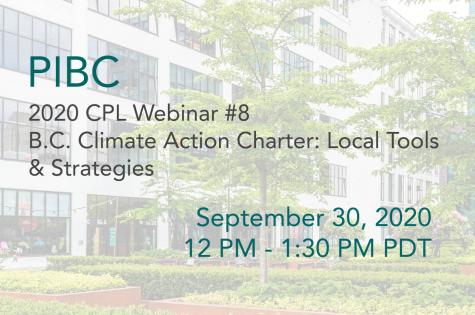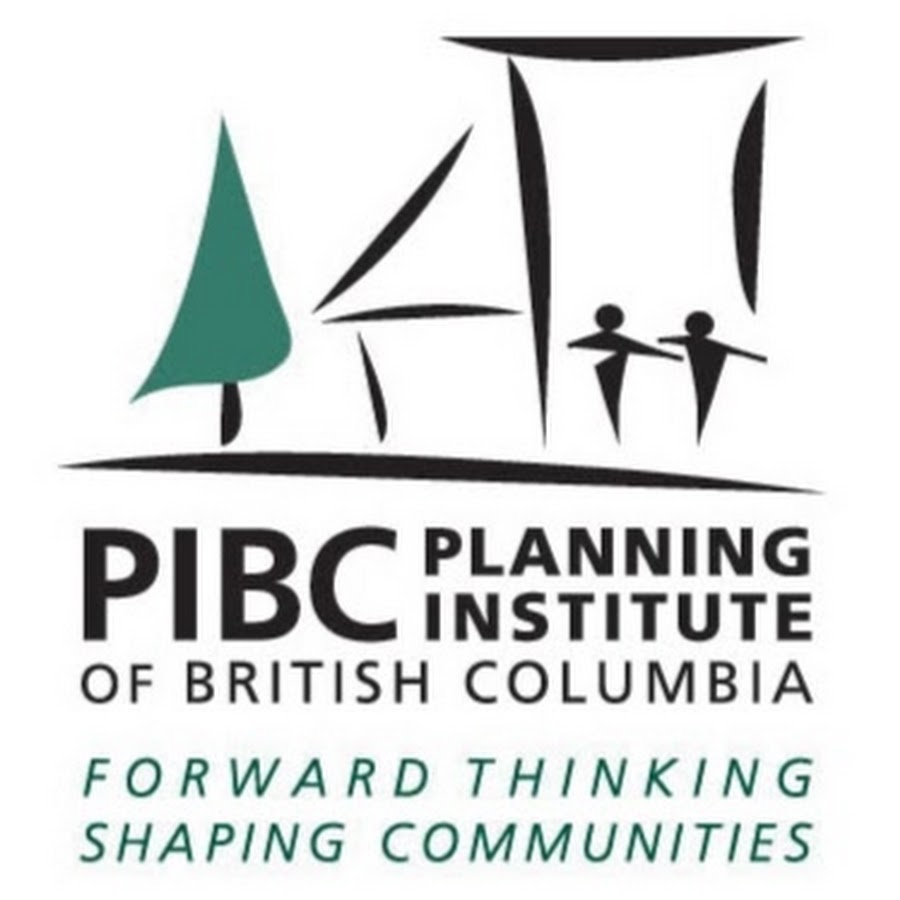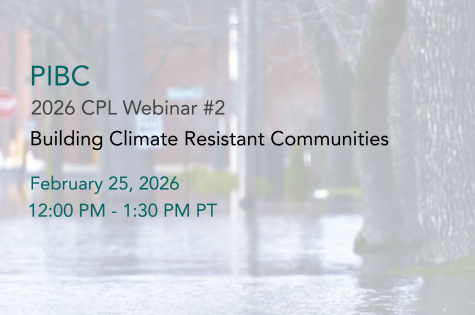Webinar recording available for purchase. Click here for more information.
Please note: Our CPL Webinar #8 is a two-part recording. The first part is now available. The second part will be available in early 2021. Webinar recording purchase includes access to BOTH recordings but does not include access to attend the live webinar in 2021 as it is already full.
To purchase webinar recordings, please contact office@pibc.bc.ca for pricing and complete information, noting the webinar year and number (for example, year 2020, webinar #1) and if you are purchasing for a Single or Group rate. An eligible current member name is required for member rates.
Webinar Overview
Recognizing that local governments have a key role to play in creating and implementing climate innovations, this webinar examines local tools and strategies for climate action.
Representatives from the Ministries of Environment and Municipal Affairs & Housing will present a B.C. Climate Action Charter "primer" and update. Two case studies will highlight innovative tools and strategies for climate action that can be applied in communities throughout the Province.
Case Study #1 - Vancouver’s Rain City Strategy - In Vancouver, a changing climate means more intense rainstorms overwhelming an already aging combined sewer and drainage network. Adapting to climate change while meeting water quality and quantity needs not only today, but also tomorrow, requires forward thinking, innovation and collaboration to mobilize action. Vancouver’s Rain City Strategy is a long-term roadmap for holistic rainwater management – integrating green infrastructure solutions into land-use decisions, infrastructure upgrades, community plans, and urban design. Combining regulation, advocacy, partnerships, and investments, green infrastructure will be incorporated broadly into Vancouver’s streets, public spaces, parks, civic facilities, and private properties, helping achieve many city-wide goals related to climate resilience, equity, environmental protection, and population growth.
Case Study #2 – Improving Mobility with Micromobility - Electric kick scooters and other micromobility vehicles are an emerging transportation mode that help solve the first and last kilometer of regional trips by transit. Discover how these vehicles can reshape transportation and what your community needs to do to prepare for them.
Presenters:
Molly Johnson
Manager, Planning and Land Use
Planning and Land Use Management Branch
Ministry of Municipal Affairs and Housing
Molly Johnson is a Manager, Planning and Land Use, with the Ministry of Municipal Affairs and Housing. She has been involved with projects such as Residential Rental Zoning and Housing Needs Reports legislation and the Development Approvals Process Review (DAPR). Her more current work is on the local government climate action file. Molly has an MSc in City Design and Social Science from the London School of Economics and has worked at the City of Winnipeg, the Province of Manitoba, the University of Winnipeg, and the University of Manitoba.
Ben Finkelstein
Manager, Communities & Built Environments
Climate Action Secretariat
Ministry of Environment
Ben has been with the B.C. Ministry of Environment and Climate Change Strategy for over 20 years spending 10 years of that time working here at The Climate Action Secretariat (CAS). Ben has managed the local government file at CAS working with colleagues mostly at the Ministry of Municipal Affairs and Housing, UBCM and the Ministry of Energy, Mines and Petroleum Resources and of course with local government staff. Although the GHG reductions have been tough to get at, it is in communities where climate action resonates mostly with citizens. It’s in this space that Ben has come to appreciate the complexities of managing climate work in the built environment. Along the way he has worked with federal and local governments, ENGOs, the academic community and foundations.
Wendy de Hoog
Senior Sustainability Specialist
Green Infrastructure Implementation / City of Vancouver
Wendy is an urban planner with a long-standing interest in policy development, engagement and storytelling. She is passionate about creating inclusive and resilient communities that consider urban water management approaches from the outset of a planning process. Wendy’s role as a Senior Sustainability Specialist is to lead, develop and implement policies related to urban water management and green infrastructure in the public realm. One of her most rewarding projects has been developing the City’s ambitious Rain City Strategy which reimagines and transforms how the City of Vancouver manages rainwater in the urban environment with the goals of improving water quality, resilience and livability through creating healthy urban ecosystems.
Thomas Thivener
Active Transportation & Regional Lead, Transportation
Watt Consulting Group
Thomas Thivener has had a major influence on active transportation in the US and Canada. From 2012 to 2019 he was the Cycling Coordinator and Active Transportation Projects Leader for the City of Calgary. He led many ambitious projects including implementation of the cycle track network pilot and several Complete Street retrofits. He also oversaw the development of Calgary’s dockless mobility pilot which included E-bikes and electric kick scooters. Prior to that he had a similar role at the City of Tucson. He has a Masters of Science in Planning from the University of Arizona. He lives in Vancouver where he manages WATT Consulting Group’s local office.







